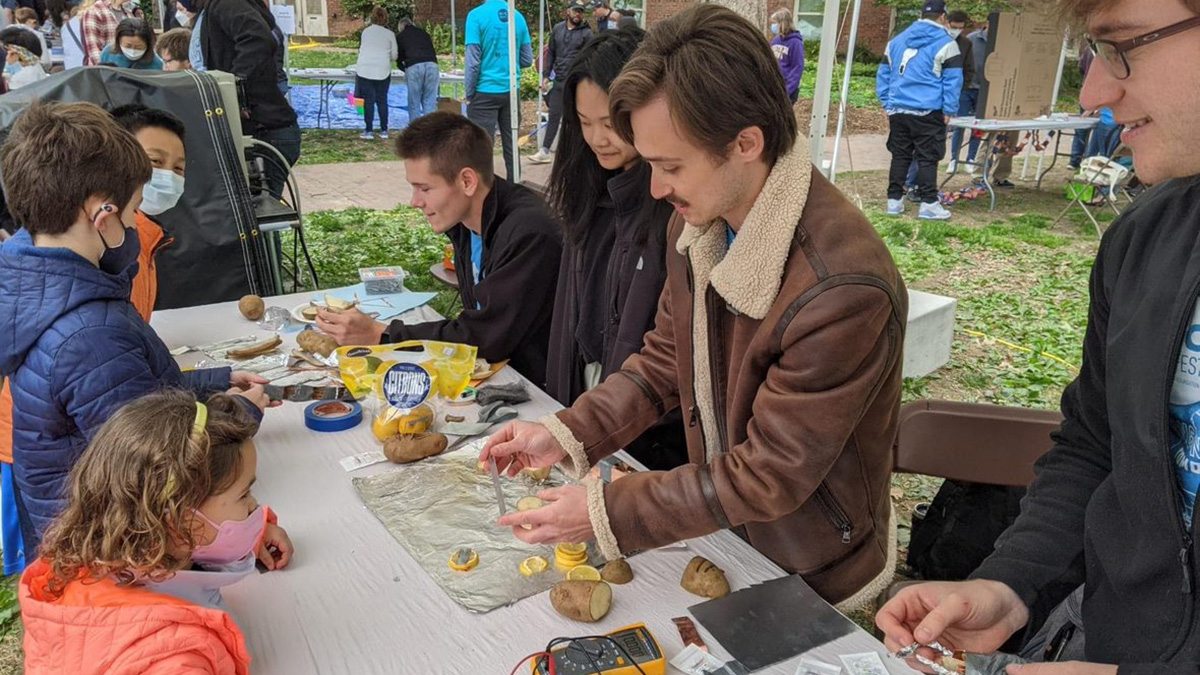Student leaders in Applied Physical Sciences help build graduate student community
The applied physical sciences department's Graduate Student Association offers professional and social activities on campus and in the community and serves as a liaison between student, faculty and leadership.

Since its launch as an official student organization in the fall of 2022, the Graduate Student Association for the Department of Applied Physical Sciences has served as the liaison between students, faculty and APS leadership to represent and support the graduate student community.
GSA offers professional and social activities within the APS community and beyond; programming is often held in collaboration with other UNC departments and local organizations. Through GSA, graduate students grow professionally and become part of a valuable community at Carolina.
GSA’s co-presidents, Kameryn Hinton and Connor Slamowitz, explained the aspirations of this new organization and the value of participating in GSA.
One of the first goals of GSA was to help students reconnect with peers after the COVID-19 pandemic. “We wanted to provide opportunities for students to interact with other students and faculty members, explore Chapel Hill and make friends,” says Slamowitz, a third-year graduate student in Professor Scott Warren’s lab. “Now, GSA has expanded to offer professional development events like a career panel, symposia, conferences, and networking opportunities to optimally position students for life after graduate school.”
Helping to host and plan events like the APS research symposium is a cornerstone of GSA. GSA is also instrumental in recruiting APS graduate students to participate in the North Carolina Science Festival and represent APS research to the broader North Carolina community. Looking ahead, Slamowitz and Hinton are eager to introduce additional programming and events. “With the support of faculty and administration, GSA can plan an array of exciting events to share research with the community at large,” adds Hinton, a third-year graduate student in Ronit Freeman’s lab.
Another key component of GSA’s programming is hosting annually a career panel of professionals from different career sectors including government, industry, and academia. Hinton explains that GSA surveyed the APS graduate student community to understand their careers of interest and invite professionals most aligned with these interests.
“For our spring 2023 career panel, we seek to broaden reach by collaborating with the Materials Research Society and other natural science departments to get more graduate students involved,” Hinton explains. GSA’s next career panel is scheduled for mid-to-late April.
Slamowitz commented on the value of leveraging GSA to foster meaningful connections between faculty and students for academic and professional growth. “It’s crucial to build connections among the scientific community for long lasting relationships. Building networks and forming relationships with faculty and professionals make the graduate student experience much more valuable and helps students understand their post-graduation goals,” he says.
Hinton adds that collaboration with other campus organizations and external groups adds value and opportunity for GSA members. “An active GSA allows us to broaden outreach not just socially but also to build professional networks outside of the department,” she explains. “We are able to branch out and increase access to a broader scope of events by working across campus and beyond.”
For example, GSA united with student groups from other universities for the 2022 Triangle Student Research Competition. TSRC is an annual poster competition that welcomed nearly 70 students from UNC-Chapel Hill, North Carolina A&T State University, North Carolina State University, Duke University and North Carolina Central University. Hinton and Slamowitz leveraged GSA’s platform to market the event and garnered significant participation from the APS department; in fact, nearly 10% of all TSRC participants were APS graduate students.
Relationships with communities beyond Carolina’s campus are an integral part of GSA’s path forward and underscore the importance of graduate student participation. “One of our larger goals is to facilitate outreach to younger scientists, other groups on campus, and the greater Chapel Hill community,” says Hinton. “We seek to share science and offer individuals a well-rounded understanding of what it means to be a scientist.”
As a young department, APS is eager to welcome new students to the graduate program and expand interactions with graduate students in other departments. “GSA is a wonderful opportunity for students and faculty of APS to ensure their voices are heard,” said Hinton. “It’s important for us to leverage the support of other, larger departments to offer interdepartmental social events and promote outreach efforts.”
In addition to strictly science-based concepts and research, GSA offers members valuable lessons in professional skills, including leadership, initiative, and accountability. “A key benefit of joining GSA is the development of collaboration and communication skills,” says Hinton. “Today’s scientists must be able to effectively communicate with others who do not have the same background to achieve shared goals.”
Slamowitz concludes with a message for students who are considering becoming involved with GSA: “It is a wonderful feeling to be part of an organization that allows me to have a meaningful impact on our campus and beyond. If you’re looking to have an impact on the department and larger community, GSA at APS is for you.”




